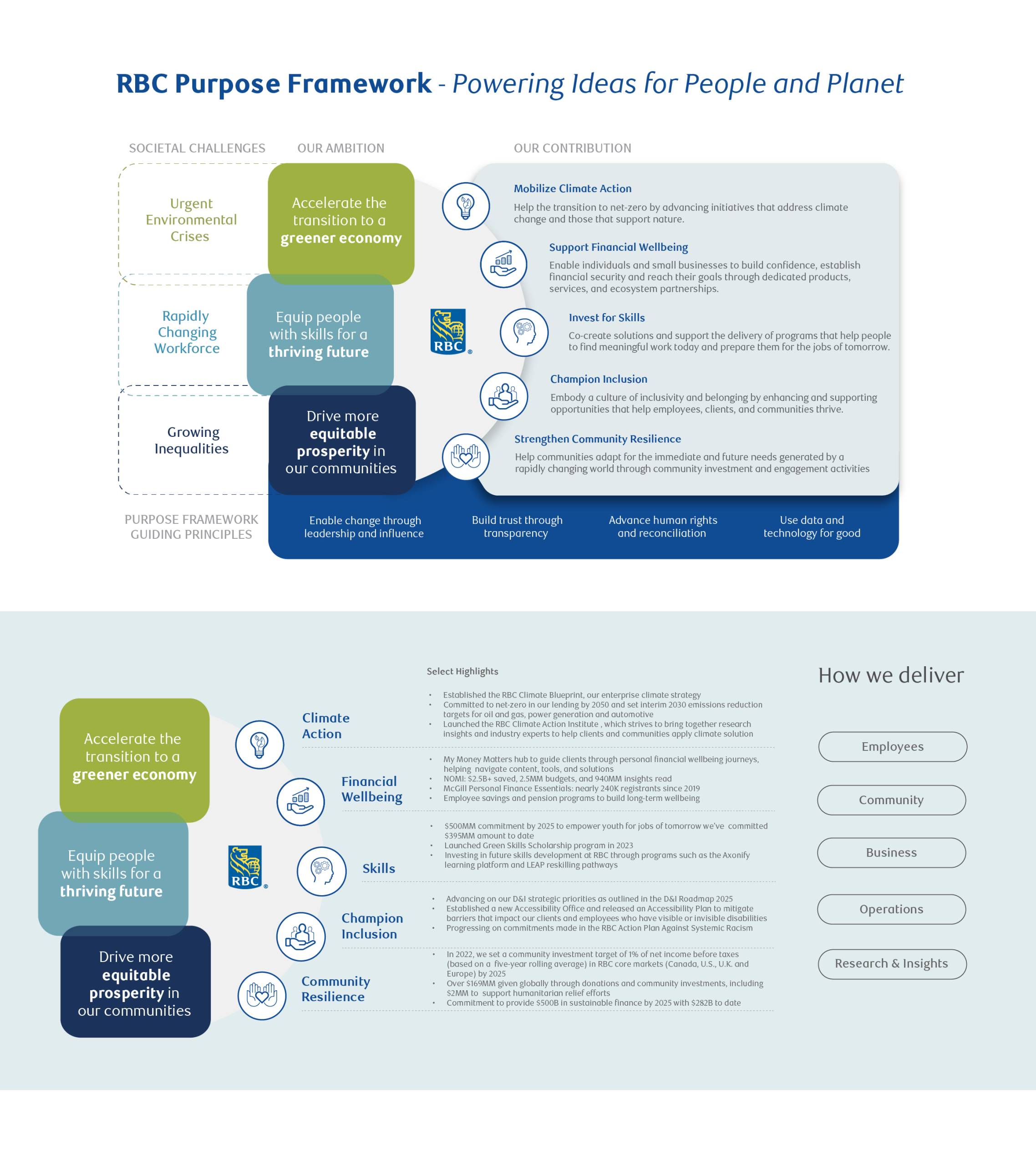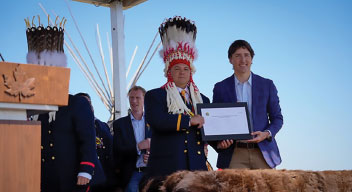What worked in the past doesn’t guarantee success in the future.
That’s the case when it comes to sustaining our enviable way of life, according to Andrea Barrack, who oversees ESG and Corporate Citizenship efforts at RBC.
The bank executive says fossil fuels have helped to raise society’s standard of living and quality of life but are now placing our planet on an unsustainable path. Advanced technologies have created millions of rewarding careers but are also displacing workers. And while prosperity is evident across the communities where the bank operates, many people are still finding it hard to move up the economic ladder.
“The environmental crisis, rapidly changing workforce and growing inequalities have the potential to undermine our collective ability to thrive and prosper,” said Andrea at a recent gathering of 400 leaders in philanthropy and social impact sectors.
In response, RBC aims to better leverage its business, operations, people, community investments, as well as its research and insights to help accelerate the transition to a greener economy, equip people with skills for a thriving future and drive more equitable prosperity in its communities.
Pursuing these three ambitions also aligns with RBC’s interests, said Andrea, given that the bank “benefits directly from the healthy environments in which we operate, the world class talent that enables our bank to grow, as well as the diverse and vibrant communities that make us strong.”

PHOTO: “The environmental crisis, rapidly changing workforce and growing inequalities have the potential to undermine our collective ability to thrive and prosper,” said Andrea
To this end, the bank executive said RBC established the “RBC Purpose Framework- Powering Ideas for People and Planet” to create clarity and structure around its three ambitions and to provide direction for decision-making.
The new Framework builds off work that is already in place, such as the RBC Climate Action Institute, RBC Action Plan Against Systemic Racism and a $500MM commitment by 2025 to empower youth for the jobs of today and tomorrow.
“The new Purpose Framework adds structure to RBC’s ESG approach, which sets the stage for our businesses to integrate ESG priorities into their operations and plans. That, in turn, could help make enterprise resources more readily available to support initiatives and programs that help support our three ambitions,” said Andrea. “Additionally, the Framework clearly identifies the challenges we are focused on and how we can help solve them. This will allow our stakeholders to understand our aims, enabling enhanced collaboration on areas of mutual interest.”
“With community investment being a key lever in our ability to drive impact, we trust our charitable community partners to do what they do best: solve problems and create opportunities,” said Andrea. “We intend to provide them with seed funding to test new ideas. If they’re shown to work, we can consider ways to help them scale the solutions to enhance their reach and impact. Its all about unlocking the talents and entrepreneurial spirit of our charitable community partners.”
RBC also plans to make charitable grants available for capital improvements to community institutions that reduce environmental impacts from their operations and drive accessibility for people with disabilities.
On an annual basis, RBC returns tens of billions of dollars back into society through taxes, salaries, dividends as well as community donations and investments. Specifically, since Dave McKay became CEO in 2014 community donations and investments have increased by 50 percent with the bank intending to distribute $169 million in 2023.
Andrea concluded: “We hope that the benefits of a greener economy, thriving workforce and more equitable communities will be distributed widely in the places where we live and work. That’s the prosperity dividend RBC wants to keep growing. It sets our bank up for success and helps us to do the same for others.”
 PHOTO: The new Purpose Framework adds structure to RBC’s ESG approach and builds off work that is already in place, such as the RBC Climate Action Institute, RBC Action Plan Against Systemic Racism and a $500MM commitment by 2025 to empower youth for the jobs of today and tomorrow.
PHOTO: The new Purpose Framework adds structure to RBC’s ESG approach and builds off work that is already in place, such as the RBC Climate Action Institute, RBC Action Plan Against Systemic Racism and a $500MM commitment by 2025 to empower youth for the jobs of today and tomorrow.
+ Disclaimers
This document is provided for general information purposes only. The recipient is solely liable for any use of the information contained in this document, and neither RBC nor any of its affiliates nor any of their respective directors, officers, employees or agents shall be held responsible for any direct or indirect damages arising from the use of this document. This document may contain forward-looking statements within the meaning of certain securities laws. Environmental (including climate), social and governance metrics, data and other information contained in this document are or may be based on assumptions, estimates and judgements. For cautionary statements relating to the information in this document, refer to the “Caution regarding forward-looking statements” and the “Important notice regarding this Report” sections in RBC’s most recent ESG Performance Report. Except as required by law, none of RBC or any of its affiliates undertake to update any information in this document.
This article offers general information only and is not intended as legal, financial or other professional advice. A professional advisor should be consulted regarding your specific situation. While information presented is believed to be factual and current, its accuracy is not guaranteed and it should not be regarded as a complete analysis of the subject matter discussed. All expressions of opinion reflect the judgment of the author(s) as of the date of publication and are subject to change. No endorsement of any third parties or their advice, opinions, information, products or services is expressly given or implied by Royal Bank of Canada or its affiliates.








